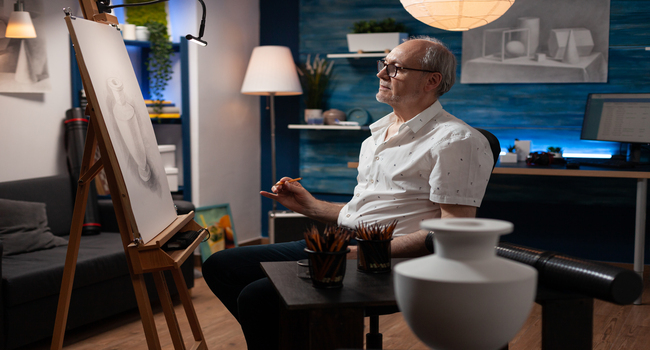
Chronic obstructive pulmonary disease (COPD) is a chronic condition that affects the lungs, making it difficult to breathe. Patients with COPD may experience symptoms such as coughing, wheezing, and shortness of breath. These symptoms can have a significant impact on their daily lives, leading to depression and anxiety. A recent study was conducted in China to investigate the effect of expressive art therapy (EAT) on the health status of patients with COPD.
The trial involved 360 participants with COPD and comorbid depression from 16 communities in China. The participants were randomly assigned to either receive EAT plus usual care (UC) or UC only. General practitioners were trained in EAT before the intervention.
The primary outcomes of the study were depression and anxiety symptoms, measured with the Hospital Anxiety and Depression Scale (HADS) and expressed as the HADS score for depression or anxiety (HADS-D or HADS-A, respectively). The secondary outcomes were the quality of life and dyspnoea, measured with the COPD assessment test (CAT).
Dyspnoea was assessed using the modified Medical Research Council (mMRC) dyspnoea scale. Lung function was expressed as the forced expiratory volume in 1s as a percentage of the predicted value [FEV1 (% pred)].
The results of the study showed that the EAT group had significantly greater improvement in the HADS-D and HADS-A scores than the UC group at 2 months and 6 months. The CAT and mMRC scores were significantly lower in the EAT group than in the UC group at 2 and 6 months. The FEV1 (% pred) was significantly higher in the EAT group than in the UC group at 6 months. These findings suggest that EAT can effectively reduce anxiety and depression symptoms and dyspnoea, improve quality of life, and improve the pulmonary function of patients with COPD.
Expressive art therapy is a form of therapy that uses art to help individuals express themselves and process their emotions. It can include activities such as painting, drawing, and sculpting. In the context of COPD, EAT can help patients express their emotions and cope with the challenges of the condition. The results of the study suggest that EAT can be an effective intervention for patients with COPD and comorbid depression.
One of the strengths of this study is that it was a community-based cluster randomized controlled trial. This means that the study was conducted in real-world settings, rather than in a laboratory. The participants were also representative of the general population of patients with COPD and comorbid depression. Another strength of the study is that it involved training general practitioners in EAT. This means that EAT can be delivered by healthcare professionals who are already working with patients with COPD.
Conclusion
The study provides evidence that expressive art therapy can be an effective intervention for patients with COPD and comorbid depression. EAT can reduce anxiety and depression symptoms and dyspnoea, improve quality of life, and improve pulmonary function. The study suggests that EAT can be delivered by general practitioners and should be considered as a treatment option for patients with COPD and comorbid depression.
__________
About COPD
Depression Resources
About Major Depressive Disorder
Managing Depression in Type 2 Diabetes with Melissa officinalis Extract
Zuranolone For Anxiety and Insomnia in Postpartum Depression
Improving Treatment for Bipolarl Depression
Creative Interventions to Alleviate Anxiety, Depression, during Protective Isolation
Boosting Physical Activity for Depression: A Hopeful Approach for In-Patient Treatment
Nasal Spray Effects on Treatment-Resistant Depression
Personalizing Treatment for Clinical Depression with Brain Stimulation
Probiotics may Improve Brain Function in Depression
Clinical Trial examines Predictors of Relapse in Psychotic Depression
Rapid Improvement of Postpartum Depression Symptoms with Brexanolone
Is Psilocybin Safe and Effective for Treatment-Resistant Depression?
Clinical Study Shows Mediterranean Diet Benefiicial for Depression
Stratified Care vs. Stepped Care: Which Approach is More Effective for Treating Depression?
Aural Rehabilitation is Effective in Treating Depression in Older Adults
Art Therapy: A Promising Intervention for COPD Patients with Depression
Can Cognitive Behavioral Therapy for Insomnia help Alleviate Depression?
Clinical Trial Proves Exercise is Effective in Treating Depression in the Elderly
Clinical Trial shows Balanced Diet can Reduce Depression
